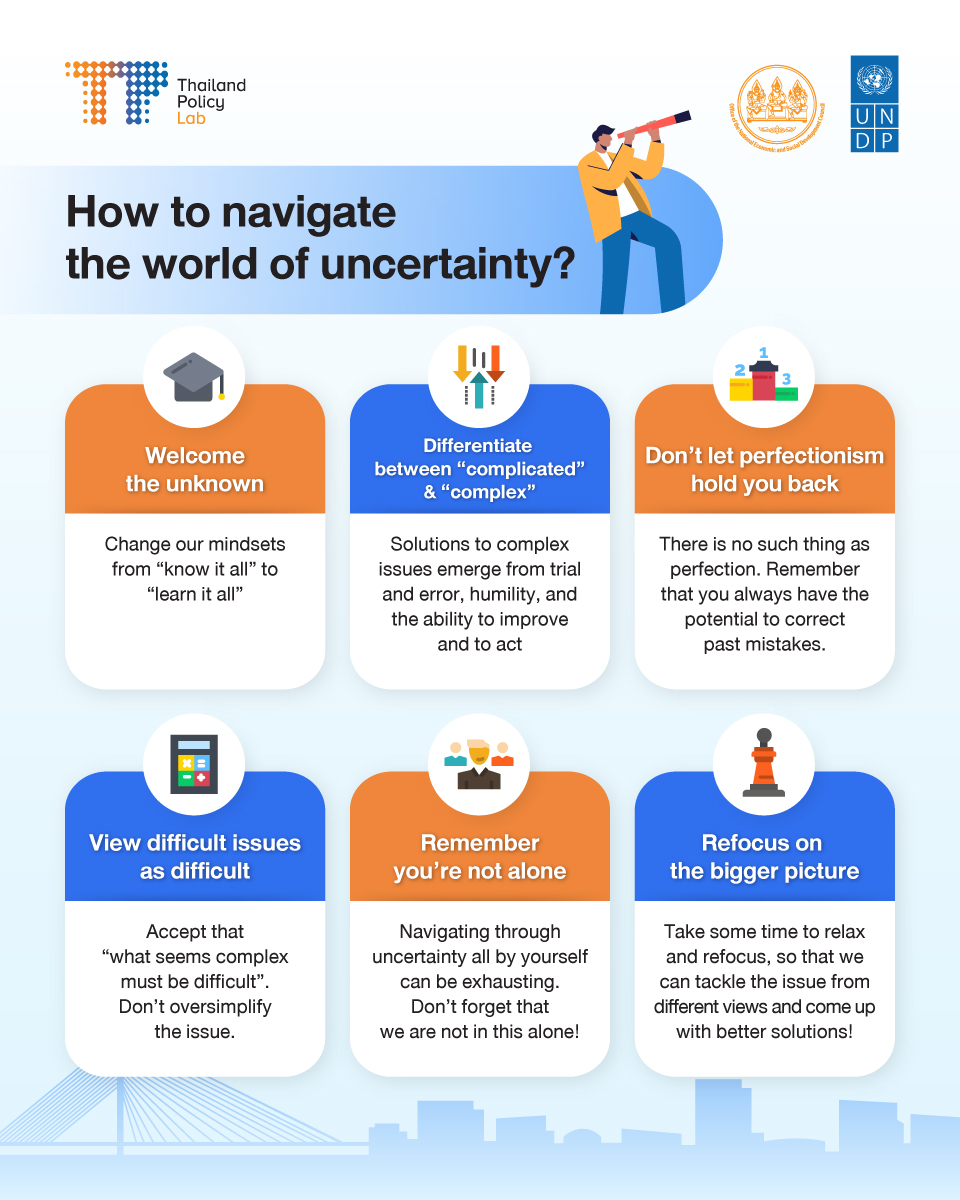“Uncertainty” became our “close friend” since the outbreak of novel coronavirus has turned the world upside down forcing us to navigate through the new ways of living. However, the pandemic is one of the many more uncertainties that can knock at our doors anytime soon. Examples of looming uncertainties are climate change that causes rising temperatures throughout the world, economic crisis, looming wars, and new technologies such as AI that can replace humans one day.
Many leaders and policy makers may feel overwhelmed and anxious about building up resilience to prepare for upcoming uncertainties especially when technology’s capacity has been rapidly evolving, while humans’ seem to stay the same.
However, if we lose our “minds” and “strengths” to disruptions, it’s difficult to navigate through the world of uncertainty. In order to firmly thread and navigate the world of complexity, uncertainty, and disruption, Thailand Policy Lab offers six strategies:
1) Welcome the unknown
Most humans are comfortable with the state of “omniscient” while proning to become anxious with the state of “unknown” because our brain might register unknown situations or conditions as approaching dangers and threats.
However, in order to navigate through the uncertainty, we need to change our
mindsets from “know it all” to “learn it all”; instead of holding onto the belief that we need to know it all, we need to think that having to learn new things is normal. In fact, not knowing is common and learning, as well as policymaking, is a life-long journey. We can embrace the discomfort of not knowing and turn them into opportunities in order to learn and strive for better policy.
2) Differentiate between “complicated” and “complex”
Most of the time we conflate the words “complicated” and “complex” despite different nuances in their definitions. For instance, filing tax forms can be complicated as it needs technical knowledge and attention to detail. No matter how complicated it seems, there will be solutions such as hiring a tax advisor in this case.
However, “complex” is the convergence of events from various perspectives. If we want to create a policy to stop climate change, we need to tackle it from various angles: environment, economy, food security, etc. Thus, solutions to complex issues need trial and error, the humility and willingness to learn from mistakes, as well as the ability to act.
3) Don’t let perfectionism hold you back
As it’s often said that “there is no perfection in this world,” striving for perfection under uncertainty and ever-changing contexts is not recommended, but the capacity to learn from mistakes should be expected instead.
Many leaders and policymakers fear that making any single mistake will hurt their publicity. But once we can let go of perfectionism, we will be able to adapt and turn the situations around including those past mistakes and conundrums into opportunities.
4) View difficult issues as difficult
Most of the time complex issues are mistaken as “simple” which makes issued policy or solutions become futile. Therefore, we should not overlook their difficult facades and accept that “what seems complex must be difficult.” This point of view will prevent us from oversimplifying any issues and help us to thoroughly analyse and, thus, be able to devise more targeted and comprehensive solutions.
5) Remember you’re not alone
Trying to navigate through uncertainty and solving complex issues all by yourself can be tremendous and exhausting. Not to mention that those solutions may not be as comprehensive and inclusive because they lack other perspectives. Therefore, teamwork is needed. Not only that it helps broaden horizons, but it also helps encourage each other through the times of uncertainty.
6) Refocus on the bigger picture
We may become immersed in a single area when trying to solve complex issues amidst uncertainty. Willingness and focus are helpful, but sometimes it blocks us from holistically analysing the issues. Therefore, take some time to relax and refocus so that we can come up with better solutions!

